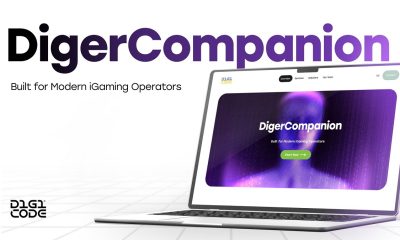Compliance Updates
Betting and Gaming Council Members Boast Record Compliance on Age Verification Checks

The members of the Betting and Gaming Council (BGC) have achieved record compliance rates for age verification checks, according to leading industry auditor Serve Legal.
Independent figures provided by Serve Legal, show bookmakers boasted a 91.4% age verification pass rate, across thousands of annual checks.
Meanwhile, casinos have a near-perfect pass rate of 98%.
This represents a 30% compliance increase across the audit volume since 2009, when Serve Legal began working with the regulated betting and gaming sector.
Regulated betting and gaming is now the leading sector in the UK for age verification compliance, better than supermarkets, convenience stores and petrol forecourts and delivering 10-15% higher compliance rates than the alcohol and lottery sectors annually.
BGC members take a zero-tolerance approach to betting by children and have significantly raised standards to protect young people.
The most popular forms of betting by children are legal arcade games like penny pusher and claw grab machines, bets between friends or family, and playing cards for money – not with BGC members.
BGC members enforce strict age verification on all their products to prevent underage gaming and will further strengthen age verification measures by increasing the checking age from “Think 21” to “Think 25” across betting shops and casinos. This policy will require anyone who is over 18 but looks under 25 to provide ID.
The BGC also funds the £10m Young People’s Gambling Harm Prevention Programme, delivered by leading charities YGAM and GamCare, which has reached more than two million 11 to 19-year-olds, and those working with them, in the UK.
Wes Himes, Executive Director of Standards and Innovation, said: “The BGC and our members are incredibly proud of these compliance rates, which put us ahead of our peers in every department.
“I am hugely grateful to Serve Legal for their work over the last 15 years, who have been instrumental in this change. Serve Legal, alongside our members and their dedicated staff, have led the charge in raising standards and setting a new benchmark for excellence.
“Bookmakers and casinos play a vital economic role on the UK’s hard-pressed high streets, as well as in the leisure and tourism sector. But economic contribution has to go hand-in-hand with the highest standards.
“We are delivering that, which should be welcome news to customers and communities across the country. Our work to raise standards goes on, and I expect these compliance rates to continue improving across the land-based betting and gaming sector.”
Serve Legal is the market-leading provider of ID and compliance testing services in the UK & Ireland. Providing extensive, independent audit services to national retailers, leisure operators and sports broadcasters, Serve Legal’s site audits help clients protect and improve operational and compliance standards.
Over the last 15 years, Serve Legal has conducted over 200,000 bookmaker and casino site audits, to ensure due diligence across a range of compliance issues for BGC members.
Audit checks were conducted at single-site businesses through to national brands with thousands of locations on UK high streets.
Serve Legal Client Manager Ali Deering said: “Compliance challenges can be greater for smaller independent bookmakers. The BGC have done admirable work in bringing them up to speed with the latest compliance support, to offer a level playing field with other big names in the industry. At Serve Legal we are proud to be supporting all of the BGC’s members, including casinos, with their due diligence and celebrate the tangible successes in each of them!”
The improvement comes as a result of new measures on customer interactions and improved “challenge on entry” standards for age verification.
Serve Legal CEO Ed Heaver said: “The Serve Legal team are incredibly proud of the work conducted by the BGC and their members. Their impressive dedication and work ethic has paid off in some highly impressive statistics, showing the 30% compliance increase across the industry over the time that we have worked in the sector. We thank the BGC for pioneering their mission of customer safety alongside ours.”
The BGC’s commitment to protecting young people extends beyond land-based betting and gaming, including recent commitments on advertising.
In 2019, BGC members introduced the whistle-to-whistle ban on TV betting commercials during live sports before the 9 pm watershed, which led to the number of such ads being seen by children at that time falling by 97%.
BGC members have also introduced new age-gating rules for advertising on social media platforms, targeting ads to those aged 25 and over unless a platform can verifiably prove that its age-gating systems can prevent under-18s from accessing regulated betting and gaming advertising content.
The BGC has also written to the Government, asking them to urge social media companies to cooperate more closely with the betting and gaming industry in limiting marketing seen by young people and problem gamblers.
Recent data from the Gambling Commission published last year showed young people’s exposure to betting and gaming adverts and promotions had declined compared to the previous year.
Of 11 to 17-year-olds, 55% had seen regulated betting and gaming adverts offline, compared to 66% in 2022, and 53% had seen adverts online, compared to 63% in 2022.
The Government has previously stated research did not establish a causal link between exposure to advertising and the development of problem betting and gaming.
The regulated betting and gaming industry is determined to promote safer gaming, unlike the unsafe and growing online black market, which has none of the safeguards strictly employed by BGC members.
BGC members overall contribute £7.1bn to the economy and generate £4.2bn in tax while supporting 110,000 jobs.
Each month in Great Britain around 22.5m adults have a bet and the most recent NHS Health Survey for England estimated that 0.4% of the adult population are problem gamblers.
The post Betting and Gaming Council Members Boast Record Compliance on Age Verification Checks appeared first on European Gaming Industry News.
Compliance Updates
Spillemyndigheden: New Guidance on Responsible Gambling

The Danish Gambling Authority has published a new gudiance on responsible gambling, which is targeted licence holders who offer betting and online casino.
The guidance reviews the rules on responsible gambling and also contain interpretations on how, as a licence holder who offers betting and online casino, can meet the requirements to offer gambling in a responsible manner.
The DGA’s guidance on responsible Gambling for Betting and Online Casino
The post Spillemyndigheden: New Guidance on Responsible Gambling appeared first on Eastern European Gaming | Global iGaming & Tech Intelligence Hub.
Betting and Gaming Council
BGC: Government Tax Hike Boost for Black Market

The Betting and Gaming Council (BGC) has warned that the incoming British tax hikes will boost black market activity.
Based on a new polling by Anacta reported in February 2026, there are concerns that proposed UK government gambling strategies, particularly regarding increased taxes, could contradict their intended harm-reduction goals.
While ministers have launched a consultation to ban unlicensed operators from sponsoring football clubs, including in the Premier League, ordinary punters fear the Government’s new tax rises could drive millions straight into illegal gambling sites, the new poll reveals.
The poll, conducted found:
• 52% of people who bet believe higher taxes will make punters more likely to use unlicensed black market sites.
• 66% of those who bet say tax increases will make betting and gaming less enjoyable.
• 57% think UK gambling is already heavily regulated.
With around 22.5 million adults placing a bet each month, the Government’s disastrous tax hikes will drive millions more to the harmful black market.
Grainne Hurst, Chief Executive of the Betting and Gaming Council, said: “When you tax responsible, regulated betting and gaming companies harder, you do not reduce demand you simply drive customers towards the unsafe, unregulated black market.
“Illegal gambling sites do not pay tax. They do not contribute to British sport. They do not invest in safer gambling and they do not protect vulnerable people.
“If the Government wants growth and genuine consumer protection, it must back the regulated sector not make it less competitive against criminals.”
The regulated sector supports 109,000 jobs, contributes £6.8 billion to the economy and generates £4 billion in tax revenue, funding everything from the NHS to schools and local communities.
The post BGC: Government Tax Hike Boost for Black Market appeared first on Eastern European Gaming | Global iGaming & Tech Intelligence Hub.
Compliance Updates
Endorphina Compliance Strategies Explained ahead of HIPTHER Prague Summit

Ahead of the HIPTHER Prague Summit 2026, we speak with Džangar Jesenov, Head of Compliance at Endorphina, to explore how the company approaches regulatory excellence, market expansion, and certification in an increasingly complex global iGaming landscape – and how strong compliance frameworks support sustainable growth across Tier-1 European markets.
You have been leading Endorphina’s compliance function since 2021. How has the regulatory landscape in Europe evolved during this period, and what shifts have had the biggest operational impact on suppliers?
If I were to compare Endorphina in 2021 and Endorphina in 2026, I would describe them as two fundamentally different projects that nevertheless share the same core identity. The primary objective remains unchanged. However, the tools, scope, and operational framework used to achieve that objective have evolved significantly.
The development of the project reflects various external factors, including increasingly stringent regulatory requirements across multiple jurisdictions, technological advancements particularly within the financial sector and, importantly, substantial strengthening of human resources. Ultimately, people remain the most critical element in any successful project.
– From a regulatory perspective, I would particularly highlight the introduction and expansion of B2B licensing policies
Across jurisdictions on different continents, and the increased responsibility placed on game suppliers.
– Most notably, the heightened focus on player protection and security
In my view, enhanced player safety is one of the most important developments in the industry. Delivering engaging, high-quality games that are fully compliant with applicable legal frameworks is the foundation of any successful online platform and this is a commitment we uphold 24/7/365.
Endorphina has successfully expanded its presence across Tier-1 European markets. From a compliance perspective, what are the key pillars that enable smooth market entry and long-term sustainability?
In practice, there are unfortunately no “miracle tools” that would allow us to operate seamlessly at the highest regulatory level.
– I may not be saying anything new or particularly surprising here, but behind every jurisdiction we enter lies a substantial amount of work
Each market requires extensive hours of analysis, including a detailed review of regulatory obligations, comparison of local data requirements and reporting outputs, development of internal policies tailored to the specific regional framework, structured internal data sharing across project teams, and the implementation of oversight mechanisms to ensure compliance with newly introduced rules.
There is a significant amount of daily routine involved continuous processes, reporting, analysis, and, where necessary, re-implementation of procedures, including updates or revisions of internal regulatory frameworks.
Certification and regulatory alignment remain major challenges for many suppliers. How does Endorphina structure its internal processes to ensure efficiency while maintaining full regulatory integrity?
With the development of regulatory obligations, our practices in this area are also evolving. Compliance in the gambling business matures like fine wine. The more stable your team is, the stronger your position on the market becomes. Today, regulations are being introduced in many new jurisdictions where gambling was completely prohibited just a few years ago, and I see this as progress from a regulatory perspective.
– Our internal processes are continuously evolving toward the automation of data that does not require increased attention
Human resources are instead focused on information that is more relevant and requires deeper integrity.
With increasing focus on information security, responsible gaming, and technical standards, how do you see the role of compliance teams evolving within modern iGaming organisations?
As regulatory obligations continue to evolve, so does our practical experience in this area. Compliance in the gaming industry matures over time – much like fine wine.
– The more stable and experienced your team is, the stronger your position in the market becomes
Today, regulation is being introduced in many new jurisdictions where gambling was completely prohibited just a few years ago. I see this as a positive development and a clear indication of progress from a regulatory perspective.
Endorphina has built a reputation as a trusted slot provider with a strong global partner network. How should compliance, product development, and commercial teams collaborate today to support scalable growth?
As Head of Compliance, I believe scalable growth is only achievable when compliance, product development, and commercial teams operate in full alignment rather than in silos. Compliance must be involved from the earliest stages of market entry and product design to prevent delays, reduce regulatory risk, and support sustainable expansion.
– Product development should focus on modular, certification-ready solutions that allow efficient adaptation across multiple jurisdictions
Commercial strategy must remain closely aligned with regulatory feasibility, ensuring that opportunities are both attractive and compliant. Ultimately, stable and experienced teams are the key factor in building long-term, regulatorily resilient growth.
Looking ahead to the next 12–24 months, which regulatory or market developments should operators and suppliers be preparing for most carefully?
In this area, we are working very intensively. Looking ahead, I anticipate further increases in regulatory obligations, faster development of regulated markets, and structural changes in core online gaming products.”
– I expect deeper integration of games with the player environment, placing greater emphasis on individual profiling and personalization of each session
These evolving models will inevitably be reflected in regulatory frameworks, with a stronger focus on player protection and proper tax accountability. At the same time, regulators will increasingly compete to attract high-quality market participants, a category to which Endorphina clearly belongs.
In the near-term perspective, many of today’s processes will become standard industry practice, while additional requirements will emerge, particularly those linked to the accountability and oversight of key individuals within licensed entities.
Endorphina is the GamingTECH Awards Party & Ceremony Sponsor at HIPTHER Prague Summit 2026. What would you like operators, partners, and industry peers to take away from engaging with your team during the event?
Thank you for the opportunity to be among the first to welcome our friends. First and foremost, I would like to thank everyone who will be joining us in person in one of the most beautiful cities in the world, Prague.
I wish all participants a truly enjoyable experience.
– Make the most of every moment spent among inspiring people
Boost your personal endorphin levels and take the opportunity to get to know the Endorphina team more closely.
The post Endorphina Compliance Strategies Explained ahead of HIPTHER Prague Summit appeared first on Eastern European Gaming | Global iGaming & Tech Intelligence Hub.
-

 Baltics7 days ago
Baltics7 days agoHIPTHER Baltics Launches in Vilnius with Agenda Revealing Lithuania’s 2026 Regulatory Reset
-

 Andrew Cardno7 days ago
Andrew Cardno7 days agoQCI Launches its Data Community Platform in Australia
-

 AI-Powered Compliance and Player Support7 days ago
AI-Powered Compliance and Player Support7 days agoDigerCompanion — Digicode’s AI Solution for Compliance and Player Support in Regulated iGaming
-

 Latest News7 days ago
Latest News7 days agoSpinomenal Debuts Magical Genie — 3×3 Hold & Hit Adventure
-

 Amusnet7 days ago
Amusnet7 days agoAmusnet Enters into Strategic Partnership with Twinsbet Arena in Vilnius, Lithuania
-

 Free spins7 days ago
Free spins7 days agoOnlyPlay Releases Pub Fruits
-

 Brazil7 days ago
Brazil7 days agoOctoplay Enters Brazilian Market Through a Strategic Partnership with Superbet
-

 BIS SIGMA7 days ago
BIS SIGMA7 days agoBrazil between expansion and fiscal pressure































